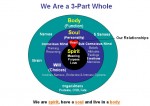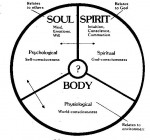The impression we get from much of what passes for Christian teaching is that the closer we get to God, the more like Him we will become, and the less like ourselves.
In this way, God is sort of pictured as a being who sucks the human life out of us and injects us with His own life so that we become less like “me” and more like Him. As part of this exchange, we also get eternal life.
 It occurred to me recently that this sort of Christian theology makes God sound like a vampire. He “bites” us, and while we continue to “look” like ourselves, we get injected with His “blood” so that we “die” but remain alive forever. As the years go by, our human nature starts to fade away, and our “divine” nature starts to show through.
It occurred to me recently that this sort of Christian theology makes God sound like a vampire. He “bites” us, and while we continue to “look” like ourselves, we get injected with His “blood” so that we “die” but remain alive forever. As the years go by, our human nature starts to fade away, and our “divine” nature starts to show through.
And as is the case with many vampires, they stop being too concerned about the humanity to which they used to belong, and use humans only for selfish reasons and personal gain. This is the dark side of being a vampire, and the dark side of being a Christian.
More Like God
It is not uncommon to encounter Christians who act as if their primary goal in life is to become less “human” and more “like God.” They give up their old friends, interests, desires, hobbies, and tastes, and instead hang out just with other Christians while studying an ancient book and speaking an arcane language that nobody else understands. They look down their noses on all the “unenlightened” humans around them who are “not filled with the Holy Spirit.” They sneer and scoff at all the ignorant masses who “live lives of emptiness and insignificance.”
But is this the way it is supposed to be?
No, I do not think so.
I believe that God wants us to be more human; not less.
God wants us to live
Jesus came so that we might have life, and might have it abundantly (John 10:10). He did not come to destroy fun and turn our smiles into frowns and our laughter into mourning, but to show us how to really have fun in life, to give us joy, and to turn our mourning into laughter.
God did not save us so that we might die, but so that we might live.
God made life, and He made this world, and He gave both to us so that we might enjoy it. Food tastes good because God made it taste good and gave us tastebuds by which to taste it. If God didn’t want us to enjoy food, He wouldn’t have given us tastebuds.
The same goes for the beauty of creation, the joy of good music, the physical sensation of touch, and even the pleasure of sex. These things are not bad or evil, but are good things God gave us to enjoy.
We worship God when we saturate ourselves with the good gifts He has given to us.
Near the end of his life, Bonhoeffer taught that God is not God at the price of emptying me of my humanity; humanity does not consist in letting oneself be sucked dry by a divine vampire! (Wink, The Human Being, 37).
The 19th Century philosopher Ludwig Feuerbach criticized Christianity by saying that we have made God in our own image, and in so doing, have become less human. He said that by putting all of our best traits onto God, we decide that these traits are not “human” but divine, and thus, we are dehumanized. Having projected what it means to be human onto God, we have become less human as a result.
The Christian religion has argued the opposite, but with similar conclusions. Seeing from Scripture that we were made in the image of God, we argue that the goal of life is to empty ourselves and become more like God. Life, we say, is found in conforming to the image of God and becoming less human as a result.
It seems that Jesus revealed a different path than either of these. While agreeing that God made us in His image, Jesus disagreed that this means we must empty ourselves of our humanity and become more like God. Jesus came that we might have life and might have it more abundantly. Jesus wants us not to empty ourselves of our humanity, but rise up to what it means to be fully human.

Becoming Fully Human
God is not most glorified when we become more like Him, but when we become more like us.
God did not make us to be God, but to be human, fully human.
We become more “godly” by becoming ourselves; that is, by becoming who God made us to be.
To fully worship God is to fully live as humans. He made us to be humans, and we fulfill our purpose by living as humans.
And this is what sets a relationship with God apart from all other belief systems in the world. Most religions in the world try to get us to be less human so that we can become like God. Atheism rightly reacts to this wrong idea, and says that to fully live, we must be fully human. The problem with atheism, is that they believe we must reject God to become fully human.
God agrees with atheists. God too believes that our purpose is to become fully human. But Jesus teaches that we only become fully human when we live as God intended. The “rules” of God are not provided to destroy life and fun and pleasure, but to maximize them.
Atheism says: “You have made God and by giving him up, you become more human.”
Religion says: “God has made us and by following Him, we become less human.”
Jesus says, “God had made us, and by following Him, you become more human.”
Jesus became human, not to lead us back to God, but to lead us back to humanity.
So start to become more “Godlike” today. How? By learning to live like yourself. This is what God wants.






 For all the mentions of human violence, references to divine violence appear almost twice as often.
For all the mentions of human violence, references to divine violence appear almost twice as often. Though innocent of any wrongdoing, God, in Jesus, let us blame Him for every wrongdoing.
Though innocent of any wrongdoing, God, in Jesus, let us blame Him for every wrongdoing.

 I would argue further that sin is the greatest proof for the existence of human true will (or free will, if you prefer that term). Why?
I would argue further that sin is the greatest proof for the existence of human true will (or free will, if you prefer that term). Why? Here then is where we arrive at the point: Just as God calls people to respond to His Word with obedience and righteousness through the exercise of their choices (non-meritorious though they might be) and fully expects them to be able to do so, in the same way, God calls people to believe in Jesus for eternal life, and fully expects them to be able to do so (cf. John 3:16; 5:24; 6:47).
Here then is where we arrive at the point: Just as God calls people to respond to His Word with obedience and righteousness through the exercise of their choices (non-meritorious though they might be) and fully expects them to be able to do so, in the same way, God calls people to believe in Jesus for eternal life, and fully expects them to be able to do so (cf. John 3:16; 5:24; 6:47).
 Regarding this verse, Calvinists are not shy in stating their beliefs about what it teaches.
Regarding this verse, Calvinists are not shy in stating their beliefs about what it teaches. These three types of people reflect the three part of a person which we looked at in the
These three types of people reflect the three part of a person which we looked at in the 
 Furthermore, it could also be argued that when Paul says the natural man “does not” receive the things of the Spirit of God, “nor can he know them,” he is not referring to an inherent inability to do so, but rather to an antagonistic mindset that refuses to seek the truth and understand these things.
Furthermore, it could also be argued that when Paul says the natural man “does not” receive the things of the Spirit of God, “nor can he know them,” he is not referring to an inherent inability to do so, but rather to an antagonistic mindset that refuses to seek the truth and understand these things.




